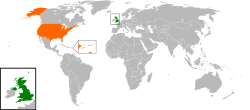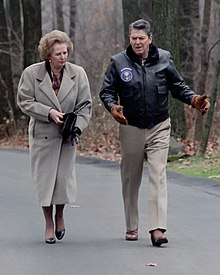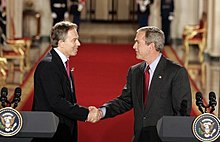Relations between the United Kingdom and the United States

|
|
|
|
|
| United States | United Kingdom |
The United Kingdom of Great Britain and Northern Ireland and the United States of America maintain particularly close diplomatic relations with one another, which is also expressed in the common term special relationship . They are shaped by the common culture and the resulting common political interests.
The “special friendship” of the two nations emerged as a result of the history of the 20th century , especially the two world wars and the Cold War . It resulted in a uniquely trusting collaboration.
Justification of the relationship and coining of the term
The special relationship goes back in two ways to Winston Churchill , Prime Minister of the United Kingdom during the Second World War . Churchill worked hard to win the US as an ally against Nazi Germany . In August 1941 he met with the US President off Newfoundland for a seminal conference. Both formulated the Atlantic Charter and agreed to increase US arms deliveries to Great Britain.
In 1945 the term special relationship was first recorded by the New York Times Herald , when Churchill described the good relations between the three transatlantic partners, the United Kingdom on the one hand and the United States and Canada on the other:
"We should not abandon our special relationship with the United States and Canada about the atomic bomb and we should aid the United States to guard this weapon as a sacred trust for the maintenance of peace."
"We should not give up our special relationship with the United States and Canada over the atomic bomb issue , and should assist the United States in preserving this weapon as a sacred investment in peacekeeping."
Even a year later, in the same speech in which he made the term “ iron curtain ” known internationally , Churchill did not use the term in the sense of bilateral relations. On the contrary, he extended the term to the Commonwealth of Nations , the political association of the United Kingdom with its former colonies. Churchill consciously introduced the cultural element of the English language , which encouraged today's connotation of the term:
"Neither the safe avoidance of war, nor the continued growth of a worldwide alliance will be achieved without what I have called the" fraternal association of the English-speaking peoples "... a special relationship between the British Commonwealth and Empire and the United States. Fraternal ties require not only growing friendship and mutual understanding between our two extensive but related social systems, but also the continuation of the close relationship between our military advisors, which leads to joint analysis of potential dangers, similarity of weapons and service regulations, as well as the exchange of officers and cadets at technical schools. It should include up-to-date facilities for mutual security through shared use of all global naval and air force bases in one country or another. However, there is one important question that we need to ask ourselves. Would a special relationship between the United States and the British Commonwealth be incompatible with our overriding loyalty to the world organization? I answer that, on the contrary, it is probably the only means by which this association will achieve its full size and strength. "
Continuation of the cooperation among Churchill's successors

During the Suez Crisis of 1956 there was a brief break in relations between Great Britain and the USA; the attempt by Prime Minister Anthony Eden to occupy the Suez Canal together with France and Israel and overthrow the Egyptian rulers, met with resistance from the two world powers. The US and the Soviet Union soon began to put massive political pressure on Britain and France. President Dwight D. Eisenhower also issued economic sanctions. Eden finally had to bow down under American pressure and retreat.
However, at a bilateral meeting in Bermuda, his successor Harold Macmillan quickly succeeded in reestablishing the relationships that had been temporarily damaged by the Suez crisis. He achieved this through his friendly relationship with US President Eisenhower, whom he knew from wartime. In addition, Macmillan and Eisenhower agreed in 1959 to leave the Scottish naval base Holy Loch to the US Navy as a location for nuclear submarines . Macmillan later succeeded in extending the close cooperation to the field of nuclear deterrence through the Nassau Agreement . Macmillan obtained the delivery of American Polaris medium-range missiles through President Kennedy's promise . On the four nuclear submarines of the Resolution class installed, they were up in the 1990s in the heart of the British nuclear deterrent policy . Macmillan, on the other hand, was for many years the main driver in the negotiations that eventually led to the conclusion of the Treaty on the Restriction of Nuclear Bomb Tests in 1963, which was signed in Moscow by the United Kingdom, the United States and the Soviet Union.
In the late 1960s there was a temporary cooling of good relationships. Under Prime Minister Wilson's aegis, the good relationship suffered noticeably; Wilson refused to comply with the American request for military support in the Vietnam War . He and President Lyndon Johnson also shared a personal dislike. The relationship between the two successors, Edward Heath and Richard Nixon , was also poor.
The close cooperation between the two countries experienced a renewed renaissance in the 1980s. Relations between US President Ronald Reagan and Prime Minister Margaret Thatcher were closer than in previous years, despite various differences of opinion. In addition to having much in common in economic policy, Reagan and Thatcher shared a deep distrust of communism. Both also rejected the détente policy of their predecessors and wanted to win the Cold War rather than peaceful coexistence. For Thatcher, a trusting relationship with the US was a top priority on her foreign policy agenda. The advantages of the close British cooperation with the USA became apparent in the renewal of the British nuclear arsenal: With the Trident program, Thatcher strengthened the cooperation between the two countries, including in the arms sector . The purchase and cooperation with the US tripled the British nuclear arsenal. Reagan and Thatcher also followed a common line on other foreign policy issues; both at G7 summits, in the joint demands for increased defense spending within NATO, and in the attitude towards Libyan ruler Muammar al-Gaddafi . Thatcher also made British air bases available to the US in 1986 when they bombed Tripoli and Benghazi . Great Britain also allowed the United States to use Diego Garcia Island in the Indian Ocean for military purposes.
The special relationship between the USA and Great Britain continued under George W. Bush and Tony Blair . Blair supported Bush's foreign policy agenda. Blair had already played a leading role in the 1999 Kosovo crisis ; After the Labor Party had criticized the weakness of John Major's Tory government during the Bosnian War in the early 1990s, Blair now demanded clear action by NATO against the Serbian ruler Slobodan Milošević . He convinced US President Clinton to deploy ground troops in Kosovo if necessary. In a speech in Chicago in April 1999, Blair presented his vision of a new political doctrine that would allow the international community to intervene on humanitarian grounds anywhere in the world to prevent oppression and genocide. After the terrorist attacks of September 11, 2001 , Blair immediately sided with the United States without compromise and actively participated in the formation of an international coalition to intervene in Afghanistan . British troops were mainly involved in this military intervention. In his speech to both houses of Congress , in which he set out his reaction to the terrorist attacks of September 11, 2001 , President George W. Bush referred to the United Kingdom as the United States' "best friend" using a hyperlative . In addition, the UK was involved from the outset in US President Bush's plans for a possible attack on Iraq under dictator Saddam Hussein , which led to the 2003 Iraq crisis . The war was controversial internationally as well as in Great Britain, where there were mass protests. Britain participated in the 2003 Iraq War with 46,000 soldiers, a third of the army's total strength .
In 2009, Secretary of State Hillary Clinton said the two countries had been working together to overcome global challenges for a long time. The special relationship between the two survives time.
Cooperation on other levels
The special relationship exists today as a form of cooperation not only at the highest (personal) level, but is also used in the field of secret service work and in the armaments sector, especially in nuclear technology.
See also
Web links
literature
- Richard Aldous: Reagan and Thatcher. The Difficult Relationship. Arrow, London 2009, ISBN 978-0-09-192608-3 .
- Frank Costigliola: Roosevelt's Lost Alliances. How Personal Politics helped start the Cold War . Princeton University Press, Princeton 2012. ISBN 978-0-691-15792-4 . (Pp. 127–141 on the Atlantic Conference)
- Anthony O. Edmonds, E. Bruce Geelhoed: Eisenhower, Macmillan and Allied Unity 1957-61 . Palgrave Macmillan, Basingstoke 2003, ISBN 0-333-64227-9 .
- Peter Mangold : The Almost Impossible Ally. Harold Macmillan and Charles De Gaulle . IB Tauris, London 2006, ISBN 1-85043-800-5 .
Individual evidence
- ↑ Investigation of the term on the website Phrases.org . Accessed July 17, 2007
- ^ Frank Costigliola: Roosevelt's Lost Alliances. How Personal Politics helped start the Cold War . Princeton University Press, Princeton 2012. pp. 127 ff.
- ↑ Source: History and Politics Out Loud . Accessed July 17, 2007.
- ^ Ernst Weisenfeld : History of France since 1945 . CH Beck, Munich 1997, p. 117.
- ^ Peter Mangold: The Almost Impossible Ally. Harold Macmillan and Charles De Gaulle . IB Tauris, London 2006, p. 82 f.
- ↑ DR Thorpe: Supermac - The Life of Harold Macmillan. Chatto & Windus, London 2010, p. 465.
- ^ Peter Mangold: The Almost Impossible Ally. Harold Macmillan and Charles De Gaulle . IB Tauris, London 2006, p. 191 f.
- ^ Melvyn P. Leffler: For the Soul of Mankind: The United States, the Soviet Union and the Cold War . Hill and Wang, New York 2007, p. 184.
- ↑ Richard Aldous: Reagan and Thatcher. The Difficult Relationship . Arrow, London 2009, p. 10.
- ↑ John Campbell: Margaret Thatcher. Volume Two: The Iron Lady . Vintage Books, London 2008, p. 186.
- ↑ Richard Aldous: Reagan and Thatcher. The Difficult Relationship . Arrow, London 2009, p. 10 f.
- ↑ Richard Aldous: Reagan and Thatcher. The Difficult Relationship . Arrow, London 2009, p. 56 f.
- ↑ Trident is go . In: Time . New York July 28, 1980 ( time.com ).
-
↑ Richard Aldous: Reagan and Thatcher. The Difficult Relationship . Arrow, London 2009, p. 47 ff.
Richard Aldous: Reagan and Thatcher. The Difficult Relationship . Arrow, London 2009, p. 163. - ↑ John Campbell: Margaret Thatcher. Volume Two: The Iron Lady . Vintage Books, London 2008, p. 627.
- ↑ Richard Aldous: Reagan and Thatcher. The Difficult Relationship . Arrow, London 2009, p. 211 f.
- ^ Charles Moore: Margaret Thatcher: The Authorized Biography, Volume One: Not For Turning . Allen Lane, London 2013, p. 572 f.
- ↑ John Campbell: Pistols at Dawn: Two Hundred Years of Political Rivalry from Pitt and Fox to Blair and Brown. Vintage Books, London 2009, p. 372.
- ↑ " America has no Truer friend than Great Britain. "George W. Bush: Address to a Joint Session of Congress and the American People . Speech on September 20, 2001 at the United States Capitol . Accessed June 7, 2008.
- ↑ US hails 'special ties' with UK. Accessed January 24, 2020
- ^ Peter Hennessy : The Prime Minister: The Office and Its Holders since 1945. Penguin, London 2000, p. 88.






